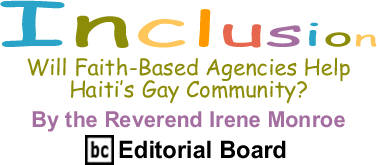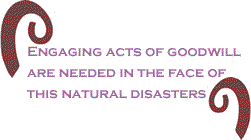
|
||||||||||||||||||||||
|
||||
 |
||||
Since
the world community has descended on
During Hurricane Katrina, former President George W. Bush's conservative faith-based organizations - like the Salvation Army, Catholic Charities, and all other organizations in Bush's �armies of compassion� - highlighted how after the storm homophobia blew in. While seemingly invisible in the disaster, many LGBTQ evacuees of Katrina and their families faced discrimination at the hands of those conservative faith-based relief organizations because of their sexual orientation, gender identity and/or HIV status. �Tragedy does not discriminate and neither should relief agencies,� stated Kevin Cathcart, executive director of Lambda Legal, in a news release in 2005. �In our experience during the aftermath of Sept. 11, LGBT people face compounded difficulties because on top of the disaster, they face discrimination when it comes to recognizing their relationships, leading to even more hardship at the worst moment imaginable.� My concern is, will many of
these same conservative faith-based relief agencies that are now
in Ironically, homosexuality has
been legal in However, as in all repressively
homophobic cultures, LGBTQ people have always found ways to express
and to live out their true authentic lives. In In a country that is predominately
Roman Catholic, homosexuality is condemned. But among For example, Petionville, an
upscale suburb of For the poorer classes of LGBTQ Haitians who live, work and socialize in the densely populated and improvised capitol city of Port-au-Prince, discrimination on the basis of their sexual orientation and gender expressions is commonplace. The 2002 documentary, �Des Hommes et Dieux (Of Men and Gods),� by anthropologist Anne Lescot, exposed the daily struggles of Haitian transwomen. Blondine in the film said, �When people insult me because I wear a dress I am not ashamed of how I am. Masisis (gay males) can�t walk down the street in a wig and dress.� But poorer classes of LGBTQ Haitians do have at least two ways to openly express and celebrate who they are - in Vodou and in Rara festivals. Although the universal perception
of Vodou is the With the belief that behavior is guided by a spirit (loa), gay males in Haitian Vodou are under the divine protection of Erzulie Freda, the spirit of love. And as a feminine sprit, gay males are allowed to imitate and worship her. And lesbians (madivins) are considered to be under the patronage of Erzulie Dantor, a fierce protector of women and children experiencing domestic violence. Erzulie Dantor is bisexual, but she prefers the company of women. Rara Festivals, a yearly festival
that begins following Carnival, belongs to the peasant and urban
poor of
And it is my hope they remember that engaging acts of goodwill are needed in the face of this natural disaster and they must be inclusive of all God's people. BlackCommentator.com Editorial Board member, the Rev. Irene Monroe, is a religion columnist, theologian, and public speaker. She is the Coordinator of the African American Roundtable of the Center for Lesbian and Gay Studies in Religion and Ministry (CLGS) at the Pacific School of Religion. A native of Brooklyn, Rev. Monroe is a graduate from Wellesley College and Union Theological Seminary at Columbia University, and served as a pastor at an African-American church before coming to Harvard Divinity School for her doctorate as a Ford Fellow. She was recently named to MSNBC�s list of 10 Black Women You Should Know. Reverend Monroe is the author of Let Your Light Shine Like a Rainbow Always: Meditations on Bible Prayers for Not-So-Everyday Moments. As an African American feminist theologian, she speaks for a sector of society that is frequently invisible. Her website is irenemonroe.com. Click here to contact the Rev. Monroe. |
||||
 |
||||
If you would like to comment on this article, please do so below. There is a 400 character limit. You do not need a FaceBook account. Your comment will be posted here on BC instantly. Thanks. Entering your email address is not mandatory. You may also choose to enter only your first name and your location.
|
||||
Thank you very much for your readership. |
||||
| Any BlackCommentator.com article may be re-printed so long as it is re-printed in its entirety and full credit given to the author and www.BlackCommentator.com. If the re-print is on the Internet we additionally request a link back to the original piece on our Website. | ||||
| |
||||
Issue 360 |
| Executive Editor: Bill Fletcher, Jr. |
| Managing Editor: Nancy Littlefield |
| Publisher: Peter Gamble |
| Est. April 5, 2002 |
| Printer Friendly Version in resizeable plain text format |
 |
 |
 |

|
 |
| |
| |

































 And
the United Nation�s International Bill of Human Rights mainly protects
LGBTQ Haitians. With no queer enclaves in
And
the United Nation�s International Bill of Human Rights mainly protects
LGBTQ Haitians. With no queer enclaves in 









